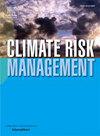遗产多因素气候变化风险评估:当前方法和未来需求综述
IF 5
2区 环境科学与生态学
Q1 ENVIRONMENTAL SCIENCES
引用次数: 0
摘要
人为的气候变化正在从根本上改变我们与共同历史的联系和互动方式。由于气候变化,重要的文化遗址已经遭到破坏和丢失,这种情况只会继续下去。考虑到气候变化影响的程度,评估气候变化风险至关重要的是,要超越气候灾害(如海平面上升)不断变化的普遍性,考虑受灾害影响的历史环境的易感性、遗产地的位置及其相对暴露程度、适应性反应及其相关风险,以及这些地方本身的文化意义。本综述概述了当前遗产的气候变化风险评估,特别关注了政府间气候变化专门委员会(IPCC)的风险框架及其风险决定因素(暴露、危害、脆弱性和响应)是如何概念化的。它系统地回顾了2017年至2022年间发表的学术文献,以确定:对四种风险决定因素的吸收;这些术语是如何表示的;将这些因素组合成一个动态风险框架的方法,该框架可以扩展到多个站点进行评估。在识别和准备气候变化的未来影响方面已经取得了重大进展,但是仍然存在对单一地点风险评估的不平衡-特别是对于历史建筑环境。此外,该综述确定并提供了多因素风险评估的总结,这些评估涉及遗产未来的复杂性,而不仅仅是不断变化的气候危害,以更好地了解气候变化对历史环境的总体影响。本文章由计算机程序翻译,如有差异,请以英文原文为准。
Multi-determinant climate change risk assessment for heritage: A review of current approaches and future needs
Anthropogenic climate change is radically changing the way we relate to and interact with our shared histories. Culturally important sites have already been damaged and lost due to our changing climate and this will only continue. Considering the extent of climate change impacts, it is vital that assessing the risks of climate change looks beyond the changing prevalence of climatic hazards, such as sea level rise, to consider the predisposition of the historic environment to be impacted by the hazard, the location of heritage sites and their relative exposure, adaptive responses and their associated risks, and the cultural significance of the places themselves. This review provides an overview of current climate change risk assessments for heritage, with specific attention paid to how the Intergovernmental Panel on Climate Change’s (IPCC) risk framework, and its risk determinants (exposure, hazard, vulnerability, and response) have been conceptualised. It systematically reviews scholarly literature published between 2017 and 2022 to determine: the uptake of the four risk determinants; how these terms are represented; and the methods for combining these elements into a dynamic risk framework which can be scaled to assess multiple sites. Significant advances have been made in identifying and preparing for the future impacts of climate change, but there is still an imbalance towards single-site risk assessments — particularly for the historic built environment. Furthermore, the review identifies and provides summaries of multi-determinant risk assessments that engage with the complexities of heritage futures beyond just changing climatic hazards to better understand the impacts of climate change on the historic environment in its totality.
求助全文
通过发布文献求助,成功后即可免费获取论文全文。
去求助
来源期刊

Climate Risk Management
Earth and Planetary Sciences-Atmospheric Science
CiteScore
8.20
自引率
4.50%
发文量
76
审稿时长
30 weeks
期刊介绍:
Climate Risk Management publishes original scientific contributions, state-of-the-art reviews and reports of practical experience on the use of knowledge and information regarding the consequences of climate variability and climate change in decision and policy making on climate change responses from the near- to long-term.
The concept of climate risk management refers to activities and methods that are used by individuals, organizations, and institutions to facilitate climate-resilient decision-making. Its objective is to promote sustainable development by maximizing the beneficial impacts of climate change responses and minimizing negative impacts across the full spectrum of geographies and sectors that are potentially affected by the changing climate.
 求助内容:
求助内容: 应助结果提醒方式:
应助结果提醒方式:


